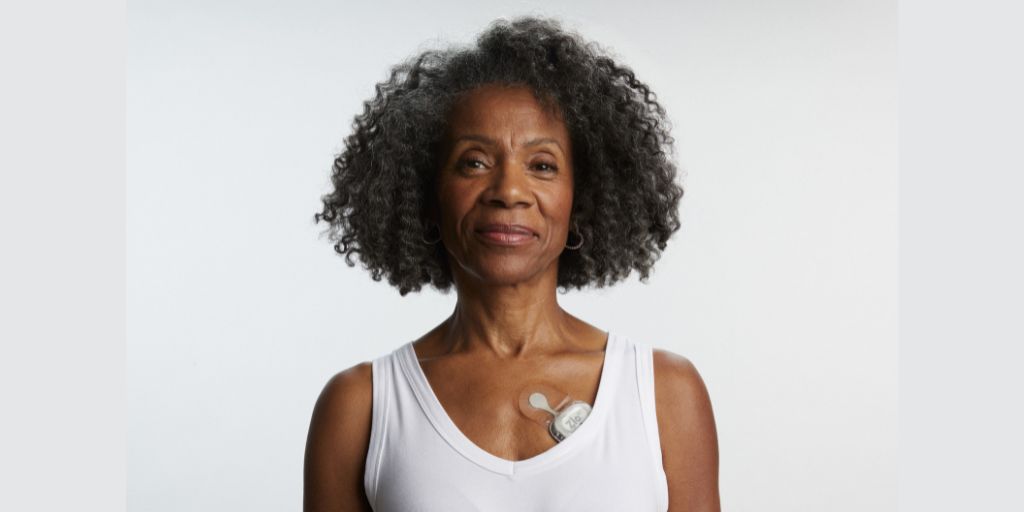
Hospitals pilot AI technology to monitor people with potentially serious heart conditions at home, with one trust seeing a reduction in waiting times to just a matter of days – potentially helping to avoid strokes and heart attacks
Hospitals in England are trialling a new monitoring device that patients wear at home to help improve and speed up the diagnosis of irregular heart rhythms (arrhythmia).
In Liverpool Heart and Chest – one of the hospitals where this technology has been piloted – patient waiting lists have been reduced from as high as 8 weeks to a matter of days. There were concerns that this figure could have greatly increased during the coronavirus pandemic.
Early detection of heart rhythm disorders, such as atrial fibrillation which affects an estimated 1.4 million people in the UK, can help to avoid more serious medical events, including stroke.
Liverpool Heart and Chest, Barts, Bristol Southmead, East Kent and Gloucestershire hospitals, amongst others, joined the pilot in 2021 to evaluate the new service which is funded through the NHS AI in Health and Care Award.
Until now, patients experiencing symptoms of an arrhythmia, such as heart palpitations or fainting, would typically need to go to hospital for 24 hours of monitoring using a traditional ECG monitor (called a Holter) for a diagnosis to be made – known as ambulatory cardiac monitoring. This technology is over 20 years old, cumbersome and can pose a challenge in gaining a diagnosis due to the relatively short period of monitoring.
Instead, patients are being fitted with an AI-enabled monitor called ‘Zio XT’ which has been developed by digital healthcare company, iRhythm Technologies.
After up to 14 days of wearing the device, which is discreet and showerproof, the patient simply returns it by post for analysis by iRhythm using artificial intelligence (AI).
Using both AI and iRhythm’s team of certified cardiac physiologists allows weeks of data to be analysed in minutes and has proven to be very accurate in helping to diagnose a range of arrhythmias. It means patients can be treated faster without the burden of repeat testing, reducing pressure on hospital resources in the process.
The iRhythm Technologies’ Zio XT Service was announced as a winner of the The Artificial Intelligence (AI) Award in September 2020. The Award is run by the Accelerated Access Collaborative (AAC) at NHS England and NHS Improvement in partnership with the National Institute for Health Research (NIHR).
Diagnosing heart conditions, however, can involve numerous and often repeated tests, including overnight stays in hospital, yet through the use of this new technology it’s possible to monitor patients over a much longer period of time and from the comfort of their own home.
Since January 2021, more than 2,000 patients in Liverpool alone have benefited from the new service. At this hospital where the technology has been piloted the waiting list for an ECG test from around six weeks to just a matter of days. There has also been a reduction in the number of referrals for more invasive and costly diagnostic procedures, likely because patients are diagnosed more accurately with the Zio technology.
Commenting on the news, Professor Jay Wright, consultant cardiologist at Liverpool Heart and Chest Hospital, said: “We are delighted to have been one of the first trusts in England to use iRhythm’s Zio XT technology at scale. We believe that this has significantly improved patient outcomes across the trust, as patients with undiagnosed and unmanaged heart rhythm conditions are much more likely to have recurrent symptoms such as blackouts or palpitations and some may even progress to a stroke. We see this service as a fantastic new tool in our efforts to prevent this.”
Dan Bamford, Deputy Director at the Accelerated Access Collaborative which manages the AI Award, said: “We’re pleased to be supporting iRhythm and their Zio XT service through the NHS Artificial Intelligence in Health Award. As one of the programmes in the AI Lab, it’s helping deliver our ambition of giving more patients access to the latest AI technologies that can improve their care.”
Sandrine Moirez, SVP GM International at iRhythm, added: “iRhythm is incredibly excited to be working with Liverpool Heart and Chest Hospital, and a number of other trusts across the UK, to bring our Zio XT service to heart patients. Patients will now benefit from the greater speed and accuracy of diagnosis that our service enables, which is essential as the NHS tries to reduce the patient backlog and treat cardiovascular conditions more effectively.”
The funding will be used to evaluate Zio XT in selected trusts with a longer term view to ensure widespread adoption across the health service.












